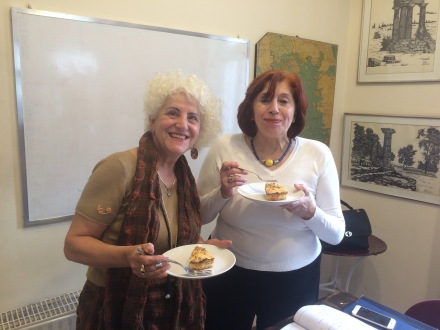One of my favorite things about the seven weeks I spent learning Greek at The Athens Centre was how we learned both the language and the culture. The Greek language is rich, and as I came to see, very logical! Although it can be complicated, there are reasons for the grammatical rules that are often based in a decidedly Greek worldview. I had so much fun learning from my teachers, Roza and Eleni, who instilled a little bit of Greece into my soul.

Below are some of my favorite facts and trivia that I learned while conjugating verbs and memorizing vocabulary.
“Here you see the Greek mentality.”
- If masculine and feminine nouns are together, you use the masculine adjective, because in grammar, the masculine is stronger, but only in grammar.
- There is a fine line between a good thing and its misuse. “Medicine” is “φἀρμακο” while too much medicine is, naturally, poison: “φαρμἀκι.” Similarly, “work” is “δουλειἀ” while too much work is, of course, slavery: “δουλεἰα.”
- “If you don’t know the past, you don’t have a future.” The future tense of a verb is formed by using the root of the past tense verb + the ending of the present tense. Roza explained that just like in counseling, you seek to understand your past and your present, because only with those two pieces can you create your future.
- “The reality has a lot of faces, but the past is the past.” There are at least five different ways to conjugate verbs in the present tense, but there is just one way to conjugate those verbs into past tense. Roza explained why with the aforementioned pithy statement.
- Although there are first person pronouns in Greek (“εγὠ”= “I” and “εσὑ” = “you”), they are rarely used. Instead, there are six endings to verbs to show who or what is doing the action (“τρὡω” is “I eat” and “τρὡς” is “you eat”). There is no separation between person and action, because we are what we do.
Random Cool Discoveries
- “ωραἰα Ελἐνι” literally means “beautiful Eleni (Helen).” This is what the Greeks call Helen of Troy. Do NOT call her Helen of Troy to a Greek, because “She is from Sparta! She is ours!”
- “εισ την πὀλη” literally means “to/in the city” and is pronounced “ees teen poli.” For hundreds of years, Constantinople was the center of the eastern Roman empire. It was so well-known, that when people asked where you were from, you could simply respond “to/in the city.” This became so prevalent that eventually the name was changed to “Istanbul.”
I didn’t realize that learning a new language could also open up new ways of thinking about the world. I hope that, after seven weeks of daily lessons, my soul is a little bit Greek.
Have you had a similar experience while learning a second (or third or fourth) language? Leave a comment and let me know!
I found an old French textbook for elementary-age students at a book sale and have been using it to review. I’m learning how to talk about inkwells and radio programs and stuff. That… might be useful at some point? We’ll see.
LikeLike
You will be befriend a very specific set of people with that vocabulary. 🙂
LikeLike
Learning a new language does indeed open up windows into different ways of thinking and understanding. I am really pleased that you are seeing these insights! A simple example is looking at a product label in English and French. The French will be longer and have more words. That in itself shows how one thinks in French differently than in English, and helps explain why another culture will view something differently than we will. There are a million insights waiting to be discovered and you are on your way. Good for you!
LikeLiked by 1 person
I like looking at patterns in language and figuring out the origins of things.
LikeLiked by 1 person